A Chorus Line
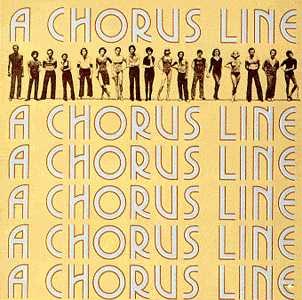
July 9,10,11,12,17,18,19,24,25
Book by James Kirkwood & Nicholas Dante
Music by Marvin Hamlisch
Lyrics by Edward Kleban
Conceived and Originally Directed and Choreographed by Michael Bennett
Directed and Choreographed for Musicals at Richter by Gene Bayliss
Assisted by Jim Clark
Musical Direction by Anna DeMasi
Produced by Joyce Northrop
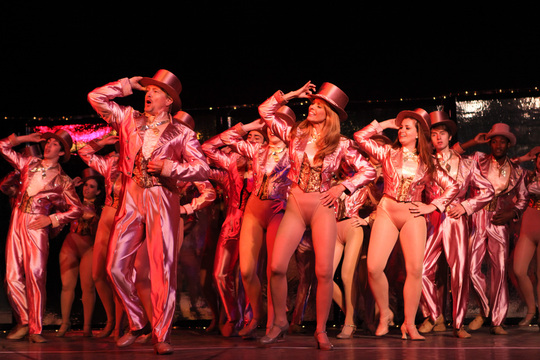
A CHORUS LINE is a
stunning musical-verite about a chorus audition for a Broadway musical.
It tells of the achingly poignant ambitions of professional Broadway
gypsies to land a job in the show, and is a powerful metaphor for all
human aspiration. Memorable musical numbers include I Can Do That, At
the Ballet, Dance: Ten; Looks: Three, The Music and the Mirror, What I
Did for Love, One (Singular Sensation) and I Hope I Get It. It is a
brilliantly complex fusion of dance, song and compellingly authentic
drama. The show was instantly recognized as a classic.
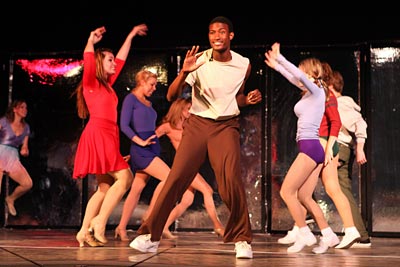
Awards 1975-76
9 Tony Awards for Musical, Book, Score, Choreography, Director, Actress, Featured Actor, Featured Actress, and Lighting Design.
5 Drama Desk Awards for Musical, Book, Score, Director/Choreographer and Actress (tie)
3 Obie Awards for Actress, Actor and Special Citation.
The Pulitzer Prize for Drama
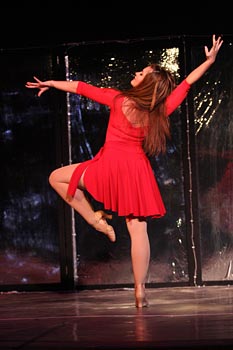
Synopsis
At
an audition for an upcoming Broadway production, director Zach and his
assistant choreographer Larry put the gypsies through their paces. Every
dancer is desperate for work ("I Hope I Get It"). After the first cut,
17 dancers remain. Zach tells them he is looking for a strong dancing
chorus of four boys and four girls. He wants to learn more about them,
and asks the dancers to introduce themselves. With reluctance, the
dancers reveal their pasts. The stories generally progress
chronologically from early life experiences through adulthood to the end
of a career.
The
first candidate, Mike, explains that he is the youngest of 12 children.
He recalls his first experience with dance, watching his sister's dance
class when he was a pre-schooler ("I Can Do That"). Mike took her place
one day when she refused to go to class – and he stayed. Bobby tries to
hide the unhappiness of his childhood by making jokes. As he speaks,
the 17 dancers have misgivings about this strange audition process and
debate what they should reveal to Zach ("And..."), but since they all
need the job, the session continues.
Zach
is angered when he feels that the streetwise Sheila is not taking the
audition seriously. Opening up, she reveals that her mother married at a
young age and her father neither loved nor cared for them. When she was
six, she realized that ballet provided relief from her family life.
Bebe adds that, as she was not a beautiful child, she was also drawn to
ballet, where she could feel beautiful. At the ballet, notes Maggie,
someone is always there, unlike the father she has never had ("At the
Ballet").
The
scatter-brained Kristine is tone-deaf, and her lament that she could
never "Sing!" is interrupted by her husband Al finishing her phrases.
Mark, the youngest of the dancers relates his first experiences with
pictures of the female anatomy and his first wet dream, and the other
dancers share memories of adolescence ("Hello Twelve, Hello Thirteen,
Hello Love"). Gregory speaks about his discovery of his homosexuality,
and Diana recollects her horrible high school acting class ("Nothing").
Don remembers his first job at a nightclub, Richie recounts how he
nearly became a kindergarten teacher, Judy reflects on her problematic
childhood, and the 4'10" tall Connie laments the problems of being
short. Finally, the newly-buxom Val explains that talent alone doesn't
count for everything with casting directors, and silicone can really
help ("Dance: Ten; Looks: Three").
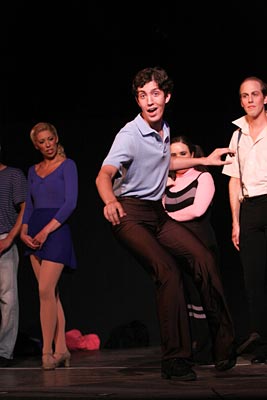 The
dancers go downstairs to learn a song for the next section of the
audition, but Cassie stays onstage to talk to Zach. She is a veteran
gypsy who has had some notable successes as a soloist. They have a
history together: Zach had cast her in a featured part previously, and
they had lived together for several years. Zach tells Cassie that she is
too good for the chorus and shouldn't be at this audition. But she
hasn't been able to find solo work and is willing to "come home" to the
chorus where she can at least express her passion for dance ("The Music
and the Mirror"). Zach sends her downstairs to learn the dance
combination.
Zach
calls Paul on stage, and he emotionally relives his early career in a
drag act, coming to terms with his manhood, homosexuality and sense of
self. Cassie and Zach's complex relationship resurfaces during a
run-through of the number created to showcase an un-named star ("One").
Zach confronts Cassie, feeling that she is "dancing down," and they
rehash what went wrong in their relationship and her career. Zach points
to the good-but-not-great dancing of the rest of the cast, the gypsies
who will probably never get out of the line. Cassie replies, "I'll take
chorus, if you'll take me!" During a tap sequence, Paul falls injured
and is carried off to the hospital: his audition is over. Zach asks the
remaining dancers what they will do when they can no longer dance.
Whatever happens, they reply, they will be free of regret ("What I Did
For Love"). The final eight dancers are selected: Cassie, Bobby, Diana,
Judy, Val, Mike, Mark and Richie.
"One"
(reprise/finale) begins with an individual bow for each of the 19
characters, their hodgepodge rehearsal clothes replaced by identical
spangled gold costumes. As each dancer joins the group, it is suddenly
difficult to distinguish one from the other; ironically, each character
who was an individual to the audience seems now to be an anonymous
member of an ensemble. However,
this initial audience reaction is misleading. As the number builds,
what becomes clear is that since we now know these people
intimately--and view them dancing here unobstructed by the so-called
star of the show--we can never regard them as anonymous chorus line
members again. Thus, the play's conclusion exposes its thematic root:
that of a loving, heartfelt salute to any gypsy who ever tread the
boards.
The
dancers go downstairs to learn a song for the next section of the
audition, but Cassie stays onstage to talk to Zach. She is a veteran
gypsy who has had some notable successes as a soloist. They have a
history together: Zach had cast her in a featured part previously, and
they had lived together for several years. Zach tells Cassie that she is
too good for the chorus and shouldn't be at this audition. But she
hasn't been able to find solo work and is willing to "come home" to the
chorus where she can at least express her passion for dance ("The Music
and the Mirror"). Zach sends her downstairs to learn the dance
combination.
Zach
calls Paul on stage, and he emotionally relives his early career in a
drag act, coming to terms with his manhood, homosexuality and sense of
self. Cassie and Zach's complex relationship resurfaces during a
run-through of the number created to showcase an un-named star ("One").
Zach confronts Cassie, feeling that she is "dancing down," and they
rehash what went wrong in their relationship and her career. Zach points
to the good-but-not-great dancing of the rest of the cast, the gypsies
who will probably never get out of the line. Cassie replies, "I'll take
chorus, if you'll take me!" During a tap sequence, Paul falls injured
and is carried off to the hospital: his audition is over. Zach asks the
remaining dancers what they will do when they can no longer dance.
Whatever happens, they reply, they will be free of regret ("What I Did
For Love"). The final eight dancers are selected: Cassie, Bobby, Diana,
Judy, Val, Mike, Mark and Richie.
"One"
(reprise/finale) begins with an individual bow for each of the 19
characters, their hodgepodge rehearsal clothes replaced by identical
spangled gold costumes. As each dancer joins the group, it is suddenly
difficult to distinguish one from the other; ironically, each character
who was an individual to the audience seems now to be an anonymous
member of an ensemble. However,
this initial audience reaction is misleading. As the number builds,
what becomes clear is that since we now know these people
intimately--and view them dancing here unobstructed by the so-called
star of the show--we can never regard them as anonymous chorus line
members again. Thus, the play's conclusion exposes its thematic root:
that of a loving, heartfelt salute to any gypsy who ever tread the
boards.
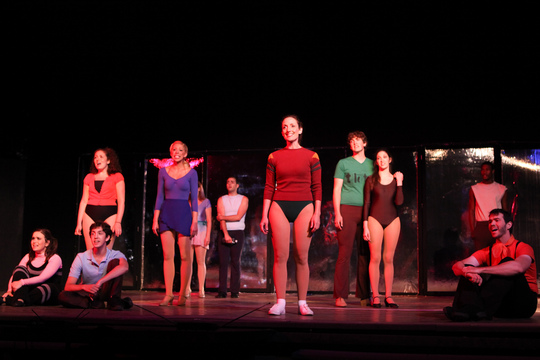
Songs
- "I Can Do That" – Mike
"And..." – Bobby, Richie, Val and Judy
"At the Ballet" – Sheila, Bebe and Maggie
"Sing!" – Kristine, Al and Company
"Montage Part 1: Hello Twelve, Hello Thirteen, Hello Love" – Mark, Connie and Company
"Montage Part 2: Nothing" – Diana
"Montage Part 3: Mother" – Don, Judy, Maggie and Company
"Montage Part 4: Gimme The Ball" – Greg, Richie and Company
"Dance: Ten; Looks: Three" – Val
"The Music and the Mirror" – Cassie
"One" – Company
"The Tap Combination" – Company
"What I Did for Love" – Diana and Company
- "One" (Reprise) – Company
The Cast
Zach - Kevin Cooper Cassie - Kristin Ruggieri Diana - Jessica Smith Paul - Chris DeMarchisMark - Ron BloisVal - Renee Kaminsky Kristine - Emma DowningAl - Adrian Appleman Richie - Khallid GrahamJudy - Stacie MoyeBebe - Caitlin Keeler Sheila - Sarah Lee MichaelsGreg - Stephen Michelsson Connie - Kate Valiska Mike - Kevin DowningMaggie - Bridget KrompingerDon - Eric HuBobby - Nathan MandracchiaTricia - Natalie MichaelsLori - Trisha CarrVicki - Charity Ferris
Cut Dancer - Janice Gabriel
Original production
A Chorus Line opened off-Broadway at The Public Theater on May 21, 1975. At
the time, the Public did not have enough money to finance the
production. They borrowed $1.6 million in order to produce the show. The
show was directed and co-choreographed (with Bob Avian) by Bennett. The
original cast starred Scott Allen, Kelly Bishop, Robert Lupone, Michael
Serrecchia, Donna Drake,Wayne Cilento, Ronald Dennis, Baayork Lee,
Priscilla Lopez, Donna McKechnie, Thommie Walsh,
Nancy Lane
,
Kay Cole, Ron Kuhlman, Rick Mason, Don Percassi, Renee Baughman, Pamela
Blair, Sammy Williams, Clive Clerk, Chuck Cissel, Brandt Edwards,
Carolyn Kirsch, Cameron Mason, Michel Stuart, Crissy Wilzak and Trish
Garland.
Advance
word had created such a demand for tickets that the entire run sold out
immediately. Producer Joseph Papp moved the production to Broadway, and
on July 25, 1975 it opened at the Shubert Theatre, where it ran for
6,137 performances until April 28, 1990. The production was nominated
for 12 Tony Awards, winning nine: Best Musical, Best Musical Book, Best
Score (Hamlisch and Kleban), Best Director, and Best Choreography, Best
Actress (McKechnie), Best Featured Actor (Sammy Williams), Best Featured
Actress (Bishop) and Best Lighting Design. The show won the 1976
Pulitzer Prize for Drama, one of the few musicals ever to receive this
honor, and the New York Drama Critics' Circle Award for Best Play of the
season.
When it closed, A Chorus Line was the longest running show in Broadway history until its record was surpassed by Cats in 1997 and then The Phantom of the Opera in 2006. On September 29, 1983, Bennett and 330 A Chorus Line veterans came together to produce a show to celebrate the musical becoming the longest-running show in Broadway history.
